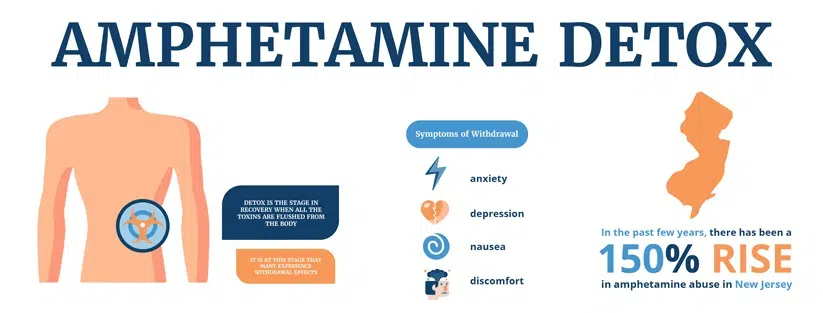Amphetamine Detox
Looking for an amphetamine detox program? At the Discovery Institute, we offer medically guided detox programs for many stimulants, including Adderall and crystal meth.
Addiction to amphetamines has the potential to impact individuals from all walks of life. These medications, commonly prescribed for conditions such as attention-deficit disorder (ADD), attention-deficit hyperactivity disorder (ADHD), narcolepsy, and obesity, can quickly lead to physical dependence or addiction with prolonged use. For those struggling with amphetamine addiction, attempting to quit independently can be a challenging task. Many individuals have experienced relapses when faced with withdrawal symptoms, highlighting the importance of seeking help from specialized drug rehabilitation facilities that focus on amphetamine detox.
At Discovery Institute in Marlboro, New Jersey, we offer a comprehensive amphetamine detox program that provides a safe and effective method to rid the body of substances and begin the journey towards recovery. Our team of certified addiction professionals closely monitors each client 24/7, ensuring their comfort throughout the entire process. Recognizing that each client is unique, we tailor an individualized substance abuse treatment plan from the very beginning to maximize the chances of a successful recovery. While addiction can lead to both emotional and physical decline, seeking treatment can pave the way for a life of well-being and fulfillment for those who are willing to reach out for assistance.
Amphetamines, a category of drugs, come in many forms. These substances belong to a drug classification called stimulants. Stimulant drugs affect the nervous system of the body. Several mental health prescriptions contain amphetamines, which can make recognizing and identifying addiction challenging for individuals who are not aware of the addictive properties of this drug. Whichever way an individual has developed an addiction to amphetamines, treatment, and a detox program is effective in helping to eliminate addiction to this debilitating drug.
Why Do I Need Amphetamine Detox?
Amphetamine detox has a bad reputation in the stages of recovery, leading some to question if they need it, or if they should do it on their own. Medical detox is an extremely vital stage in the process; if done incorrectly, it could have dangerous side effects.
Detox is the stage in recovery when all the toxins are flushed from the body. It is at this stage that many experience withdrawal effects. These effects can include anxiety, hallucinations, itching, discomfort, vomiting, nausea, and so on. While these are extremely negative and no one would wish to have them, it is necessary to pursue detox with a medical professional. This stage, although very uncomfortable, is crucial to wash all the substances from one’s body. Many try to complete the amphetamine detox process on their own. However, this is highly discouraged since it is less likely to succeed. Also, it is also extremely dangerous to the individual attempting to detox from amphetamine use.

When you experience withdrawal symptoms, your body is unstable. Your mind will not be under your control completely, and if done without a medical professional, one could relapse while trying to detox. However, at the same time, sometimes the addiction is so severe that the withdrawal effects could either be harmful or fatal. If you need amphetamine detox with us at the Discovery Institute, you will have 24/7 supervision, and even be prescribed soothing medication if the circumstances are met.
The Prevalence Of Amphetamine Abuse in New Jersey
According to the National Drug Intelligence Center, the state of New Jersey is at a high risk of widespread distribution of illegal drugs due to its geographical location and the presence of various criminal organizations operating illicit distribution networks within the state. The focus primarily lies on the abuse of cocaine and heroin, as marijuana users are less likely to engage in violent criminal activities. It is alarming to note that 70% of all violent crimes can be directly attributed to illegal drug activities, with heroin alone accounting for 38% of all federal sentencing cases, significantly higher than the national average of 8%. The use of illicit substances can have severe detrimental effects on one’s physical health, particularly if addiction to substances like heroin develops. Additionally, all substances can significantly impact an individual’s mental health if they become trapped in a cycle of drug addiction, necessitating appropriate mental health treatment for resolution.
Over the past seven years, there has been a consistent rise in drug overdose deaths, with the rate increasing from 16.7 per 100,000 in 2015 to 32.0 per 100,000 in 2020. Drug abuse and addiction are behaviors that can rapidly consume an individual’s life. Although New Jersey fares relatively better than many other states in terms of mental health and drug addiction, there remains a pressing need to assist individuals in overcoming these issues. This entails providing adequate mental health services and substance abuse treatment that addresses the underlying causes of these problems.
Proper substance abuse treatment not only facilitates the safe management of withdrawal symptoms but also grants individuals access to a wide range of services, resources, and professional assistance that can significantly improve their mental health. This comprehensive care is crucial for individuals seeking a genuine chance at recovery and may involve individual counseling or family therapy to aid in their reintegration into the community.

The Effects of Amphetamines On the Brain and Body
Recreationally and medically, amphetamines are often used for their mentally enhancing properties. Much like other stimulants, amphetamine offers its effects by upping the production of naturally produced neurotransmitters in the brain.
Certain neurotransmitters, such as dopamine, serotonin, and norepinephrine, are stimulated by amphetamines. Increasing the transmission of these components leads to an enhancement of cognitive effects and euphoric properties with the use of amphetamines.
These mentally stimulating properties of amphetamines are meant to help patients who are diagnosed with disorders like ADD and ADHD. But, for others, the mentally and physically enhancing properties of these substances eventually lead to dependence and addictive behaviors.
Examples of amphetamines in both medical and illegal forms include:
- Adderall
- Vyvanse
- Ritalin
- Strattera
- Dexedrine
- ProCentra
- Dextrostat
- Dextroamphetamine
- Methamphetamine (illicit street drug)
Becoming Dependent on Amphetamines
After individuals use amphetamines for a while, they may become dependent on these drugs. Even if a person is using these amphetamines for medical reasons, he or she may become physically dependent on these substances.
Dependence is when the body starts to recognize the presence of a drug and develops a tolerance for it. In other words, after using amphetamines for a while, people’s bodies get used to functioning under the influence of amphetamines. Once this tolerance occurs, people will find that the substance they’ve been using seems to be less effective. This often leads to drug misuse; individuals may begin to use more and more amphetamine drugs, using the substances more frequently or in larger doses, in order to feel the desired effects.

Eventually, with increased doses, users start to experience the effects they desire but they also begin to experience some adverse effects of the drug. If a person is dependent on an amphetamine drug, he or she will develop withdrawal symptoms a little while after the last use.
Withdrawal is basically the way the body says that it’s used to receiving a chemical and can no longer function properly or effectively without it.
Individuals who are dependent on amphetamines may experience some of the following symptoms:
- Depression
- Anxiety
- Suicidal thoughts
- Exhaustion
- Sleeplessness
- Nightmares
- Body aches
- Lack of concentration
Long-Term Effects of Amphetamine Abuse
Unfortunately, amphetamines are so addictive that many people become addicted to these drugs soon after they begin using them. Also, the fact that these drugs can be toxic and addictive could lead to overdose and death as a result of using them. With time and excessive use, the effects of this drug grow more damaging. With long-term use comes long-term consequences which may include:
- Psychosis
- Teeth decay
- Mood swings
- Violent behaviors
- Respiratory issues
- Cardiac system issues
- Decreased motor function abilities
- Audio and visual hallucinations
- Seizures and/or convulsions
- Other adverse reactions to the effects of amphetamines
CONTACT US
Find out how we can help
Our compassionate counselors are standing by to answer any questions you may have. After helping thousands of people over the last 50 years, we have the resources to help you and your family and all your individual needs.
The Process Of Amphetamine Detox
Before those who are struggling with amphetamine addiction can receive help through various treatment methods, they need to go through a professional detox process. Detox, also known as detoxification, is the process of eliminating the presence of a drug from a body.
Essentially, people who are in the process of detoxing must wait until withdrawal symptoms subside, signaling the elimination of the drug from the body. Some of the symptoms of amphetamine withdrawal include the following:
- Anxiety
- Agitation
- Irritability
- Depression
- Bodily aches
- Increased appetite
- Fatigue and tiredness
- Thoughts of suicide
- Sleep disturbances (i.e. nightmares)
The agitating and debilitating withdrawal symptoms that come after ending amphetamine use can be both uncomfortable and, sometimes, dangerous without the help of a professional and clinical team. This is why it’s important for individuals to go through a medical detox program if they are attempting to end addiction in their lives.
A medical amphetamine detox program can help people to feel more comfortable as they end substance abuse. Often, detox programs offer patients non-habit forming medications to help reduce or even prevent agitating withdrawal symptoms.
Also, patients can rest, knowing that they are in the safe care of medical professionals in the case of any emergency throughout the withdrawal process. Although detox may not be the most pleasant of experiences for people who are seeking a life of recovery, Discovery Institute provides compassionate, educated, and qualified staff to offer a more comfortable approach to the common amphetamine detox program.
The Discovery Difference: Our Technology
Self-detoxing without the help and support of medical professionals can lead to relapse. We are committed to helping our clients safely and comfortably detox from substance use at Discovery Institute. When it comes to overcoming amphetamine addiction, your physical health is our priority. That’s why we use wearable technology to monitor vitals and better understand the symptoms people are experiencing.
The initial stages of amphetamine detox and recovery can be difficult and some withdrawal symptoms can be life-threatening. But, through our wearable technology, our nursing staff can easily read vitals and quickly act when an issue occurs. If there are changes in heart rate, signs of an oncoming seizure, tremors, stress levels, or any other physical withdrawal symptoms, we can swiftly jump into action due to the monitoring of Discovery’s wearable technology!
As our wearable technology works to properly and efficiently monitor and record vitals, our medical staff can have more time to focus on treating our clients’ needs. We’re revolutionizing the field of behavioral healthcare. That’s the Discovery Difference.
After Our Amphetamine Detox Program: The Help You Need to Stay Sober
Once individuals complete the medical detox program, they can go through addiction treatment. Through treatment, which includes various therapy approaches, people can gain the education, support, and counseling they need in order to establish a clear path to sobriety.
Each individual is different and has individual needs throughout the recovery process. Addiction affects people in varying ways and causes people to struggle in various areas of life. So, it’s important for treatment to take a unique and individualized approach for those who need help overcoming substance abuse.
Here at Discovery Institute, we come up with customized treatment programs for every person seeking help for amphetamine addictions, as well as other types of substance use problems. It’s not always easy to work through substance misuse and overcome addiction. There will certainly be plenty of challenges along the way. But, here at Discovery Institute, we are confident that our clients can and will become free from addiction!
With determination and the right resources, individuals can break free from the bondage of amphetamine abuse and live without addiction. Allow us to help you to live the life you deserve, a life that is free from addiction! Just contact us here at Discovery Institute today to learn how we can help.
Finding Hope At Discovery Institute
Whether we are working with adolescents or adults, Discovery Institute offers the most comprehensive care available in New Jersey. We believe that individuals should not be defined by their alcohol and substance use. Addiction is simply a disease that necessitates medical care and supervision. Our substance abuse treatment programs have gained a strong reputation for their exceptional effectiveness. Regardless of the specific problem, whether it be amphetamine addiction, heroin addiction, alcohol addiction, etc., we’re fully prepared to assist you in addressing your drug addiction.
Our team possesses the necessary medical knowledge and compassion to guide you on your path to recovery. There is no need to delay, as we are just a phone call away. Our dedicated team is ready to provide you with the proper treatment and care to help you overcome your substance abuse issues, all while ensuring your comfort is not compromised.


